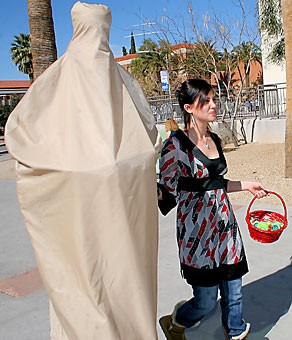Students are having less sex, according to surveys by Campus Health Service.
Local organizations were on the UA Mall Friday for Sexual Responsibility Week to offer students information about sexual responsibility, whether they are sexually active or not.
Vendors enticed students with free giveaways of condoms and other items, a guess-the-number-of-condoms-in-the-jar contest and appearances by Mr. Condom.
Some of the organizations at the event promoted abstinence until marriage while others promoted the use of condoms and testing for sexually transmitted diseases, said Lee Ann Hamilton, a health educator for Campus Health.
“”There’s more to sex than condoms,”” Hamilton said.
She said being prepared for sex, knowing what you want from your relationship and getting consent are major components of sexual responsibility.
Hamilton said she has seen a decrease in the number of students who say they have had sex since the 1980s and 1990s.
A 2006 survey by Campus Health showed that 75 percent of seniors and 55 percent of freshman reported ever having sex.
The trend is likely due to students knowing more about sexually transmitted diseases and abstinence-only being taught as part of sexual education, Hamilton said.
Sexual responsibility means practicing protected sex, said Alyssa Matus, a pre-nursing freshman.
“”Stuff like this helps because it makes it less taboo to talk about condoms and stuff,”” Matus said of the Mall event.
Students said their best sexual experience happened when they consumed little or no alcohol, felt safe with the person they were with and when they were ready.
The worst experience was the opposite, according to Campus Health surveys.
Jill Nguyen, a molecular and cellular biology senior, said she and some of her friends stopped at some of the booths to pick up the giveaways.
“”Condoms, lube, pamphlets – just whatever,”” she said. “”I got a compass, too.””
Nguyen also said the giveaways are helpful to students.
“”The cost of condoms is expensive and that probably deters a lot of people (from buying them),”” she said.
The Tucson Indian Center also provided condom wallets.
“”It can be a little more discreet than just carrying them loose in your purse,”” said Simona Damon, health promotion specialist for the Tucson Indian Center.
Campus Health pharmacists were at the event to show students the products they offer, including personal lubricants, female condoms and dental dams.
One of the more popular items at the Campus Health pharmacy is a pack of 100 condoms, which sells for about $20, said Casey Crowley, a pharmacy technician with Campus Health.
Organizations represented on the Mall included Planned Parenthood, Catholic Social Services, Southern Arizona AIDS Foundation, Tucson Indian Center, Reachout, Kino Teen Center, Campus Health Pharmacy, Student Health Advisory Committee and Pima County Health Department.









